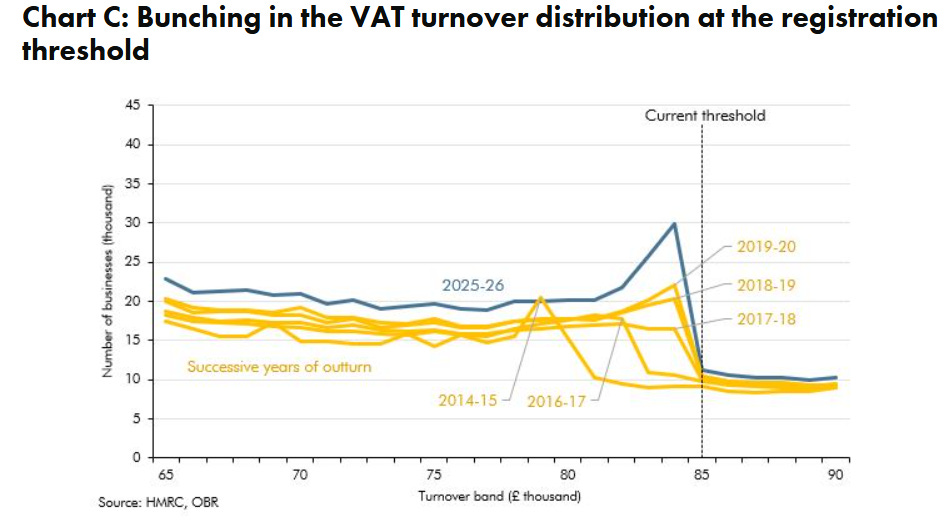In the UK a company must register for VAT when turnover exceeds £90,000. This threshold has lots of bad consequences. It deters small firms from growing. Take on an extra contract, and suddenly you must raise prices 20% or see your margins suffer. Around one in five businesses close to the VAT threshold turn down work each year, with the OBR data below showing this very clearly. They suggests that the lack of VAT threshold indexation 2017-18 to 2023-4 reduced UK output by £350m.
It also hits growth in other ways. Not charging VAT gives small firms a significant commercial advantage - and gives big firms a significant commercial disadvantage. Rather than comtracts going to the most efficient firm, they will sometimes go to a small firm that is cheaper just because they are VAT free. Small firms typically have lower productivity than larger firms: biasing commerce against the productive will not make us rich.
We really do need to sort this out.
The Federation of Small Businesses wants the threshold to rise to £100,000. That is not sensible. It just moves the problem, and it costs quite a lot of money - about £500m a year, according to tax expert Dan Neidle.
Our VAT threshold is already higher than in any EU country, and double the EU average. It would be sensible to half it, or even reduce it to the Netherlands rate of about £18,000. That means that pretty much all businesses are included, with only “hobby businesses” and “side hustles” exempt. It means proper businesses are never deterred from growing - they would always over the threshold. It also creates a level-playing field between firms of all sizes, as well as raising at least £1bn for the Treasury. That is the best option.
Politically, of course, it might well be worse than the (sensible) harmonisation of VAT on hot food (aka the pasty tax) or the (sensible) reduction in a sector specific inheritance tax break (aka the Family Farm tax).
So what else could we do? We could follow Dan Neidle’s idea of having different VAT rates for different turnovers. For example, VAT could be 20% if your turnover is £90k or more, 10% if it is £45k, etc. With tax being digital this could probably work, but it does seem both complex and odd. I might price up a contract early in the year with the expectation of one VAT rate, and find at the end of the year that I need to levy another. Since the customer will already have paid, I would have to make up the difference.
So here is another idea. Maybe better, maybe not. At the moment people have to declare their income on their tax returns. I propose that the self-employed would have to declare whether they were VAT registered. If they are not, they would be charged a “VAT-exemption levy”.
This would catch all those not registered - people with side hustles as well as small firms that have decided to remain below the threshold.
The VAT-equivalent rate would be 16.7% (20/120 for those interested in the technicalities), but of course VAT registration allows a company to offset purchases, so a lower rate would be appropriate.
Creating a VAT exemption-levy would reduce or eliminate the disincentive to grow. For sure, going above the threshold would still mean levying VAT, but it would now mean that the individual no longer has to pay the VAT-exemption levy. It would be swings and roundabouts. It would also mean that small firms and large firms would compete on a more even basis. All this is good for GDP.
Politicians often ask me for popular, costless ways to raise growth. There are none. But there are lots of ways to increase growth that some people will dislike. Politicians need to decide who they are willing to annoy in the short term, to create economic growth that is definitely what voters want in the medium term.
Declaration of interest - I would be worse off if this happened, as my side hustle income from writing substacks and the like would be subject to this levy.





Something like lowering the threshold for the VAT flat rate scheme only? https://share.google/0nrOzJoAs5EihOsco
I think the idea of reducing the VAT threshold is definitely a bad one - and would only be suggested by someone who's never actually run a small business - it would deter people from even starting a business and would definitely encourage A LOT more cash only business leading to lost taxes.
Large businesses are not at a competitive disadvantage from having to charge VAT as they are unlikely to even be interested in bidding for the type of small projects that small businesses do. They usually operate in completely different spheres.
Personally, I think scrapping VAT all together is the best way forward to generate growth and economic activity but that won't happen so raising the threshold is the next best alternative.